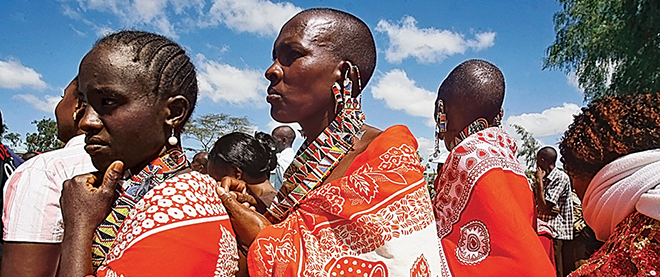Good news, bad news
A weekly round-up from around the world
Daniel Irungu/EPA/Keystone Press
Share

Here comes the sun
The Keystone XL pipeline won’t spark more feverish oil sands activity in Alberta, as environmentalists charge, and competing options to get our crude into the U.S., such as by rail or truck, would be even dirtier. So says a U.S. State Department report, which also approves of the pipeline’s proposed new route to Texas. All reason for optimism in Canada’s energy sector. So is a Royal Dutch Shell report (which greens will hail, too) predicting solar power may become the world’s largest energy source by 2070. The forecast assumes soaring energy prices and admits the crucial role unconventional energies—including the oil sands—will play in the future.
Can we try this in Canada?
A Dubai father has successfully sued a private school for more than $21,000 after he proved it failed to properly educate his young son. Seeking compensation for two years’ worth of registration fees, he accused the school of negligence for allowing the child to pass the first grade despite poor marks—negligence that led to emotional distress. A court-appointed education expert assessed the child and agreed.
A gay ghetto folds
The Pump Nightclub, the only gay club in Saint John, N.B., will close its doors at the end of the month, largely, say its owners, because younger members of the city’s gay community now feel perfectly comfortable in mainstream clubs—and because their non-gay peers now feel perfectly comfortable with them. It’s never nice to see a business shut down, and older gay folks in Saint John will lose their preferred watering hole. Still, it’s a welcome sign of positive change when difference gets embraced on the dance floor.
Winter hockey babies
Three psychology professors have found what relatively younger hockey players have always known: coaches may like relatively older players more, but it’s the younger ones who deliver. Published in the PLOS One web journal, the study looks at how a player’s birth month steers the way NHL scouts and coaches judge potential drafts, with players born early in the year favoured over those born later. That’s a bad call: on average, says the study, those born in the second half of the year outscore their older counterparts. So there.
Bad News
Foot, meet bullet
With $1.2 trillion in budget cuts, sequestration was thought to be so awful that Republicans and Democrats in the U.S. Congress would be forced to negotiate something better. It was implemented last week when, incredibly, they couldn’t. Adding to the so-called fiscal cliff and debt-ceiling debacles and it’s yet more proof that U.S. lawmakers have come to enjoy the sensation of a bullet entering their own collective foot—not to mention addling the world’s most dynamic economy (and maybe ours in the bargain).
Unwelcome comeback
What a contrast. Last week, former Italian PM Silvio Berlusconi staged an unlikely return to the centre of his country’s carnivalesque political scene, winning the likely role of kingmaker in the elections. Then, this week, something different: the prosecutor in his sex trial used the term “bunga bunga” to describe the dancing he says went on at Berlusconi’s alleged prostitution orgies. How nice. A country crucial to solving the eurozone crisis—to which the world economy is held hostage—puts its fate in the hands of an incurable roué.
She’s no saint?
Turns out the wimple is an imperfect defence system: critics are after Mother Teresa again. Based on an exhaustive reading of the literature detailing her good works, three Canadian scholars have concluded that she’s a fraud who built her own saintly myth through a well-honed media campaign. The paper, which appears this month in Studies in Religion, calls her methods of caring for the ill “rather dubious.” When told her missions were unhygienic and skimped on care, she replied that seeing the poor suffer was “beautiful” and “like Christ’s Passion.” The paper also calls her management of the huge sums of money she received “suspicious.”
Everyone loses
Last season, a handful of Ontario children’s soccer leagues stopped keeping score or calculating standings, a move the Ontario Soccer Association will make mandatory next year. The OSA says scoreless play allows under-12s to develop skills on the field. But teaching them how to win and lose gracefully is just as important. Nor is there anything wrong with scoring. Without it, soccer is little more than aimlessly kicking a ball.